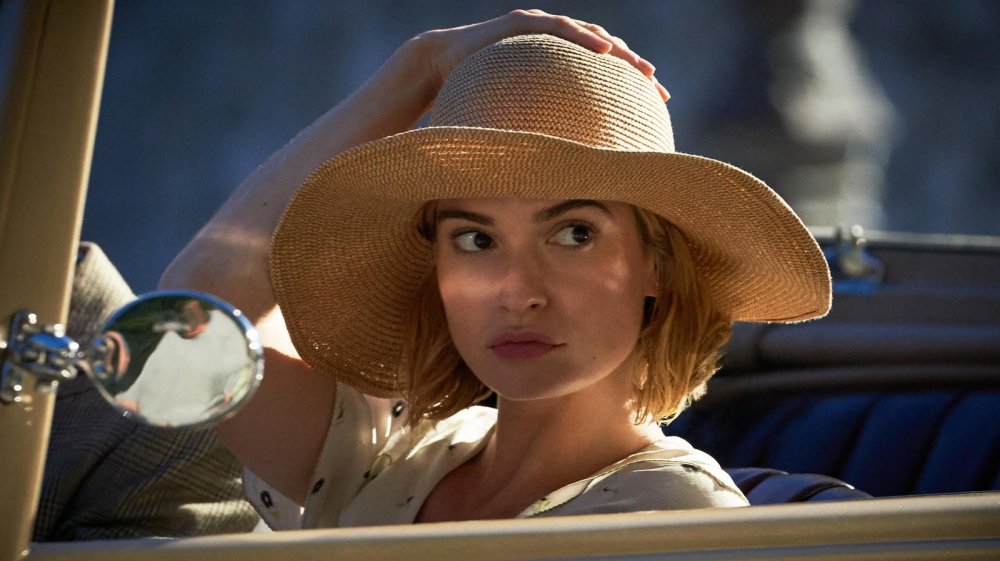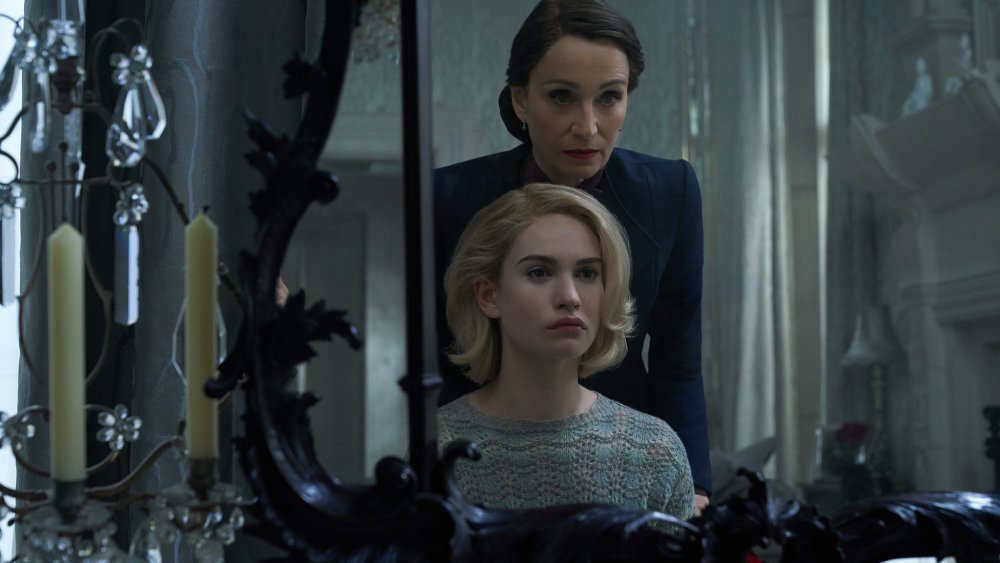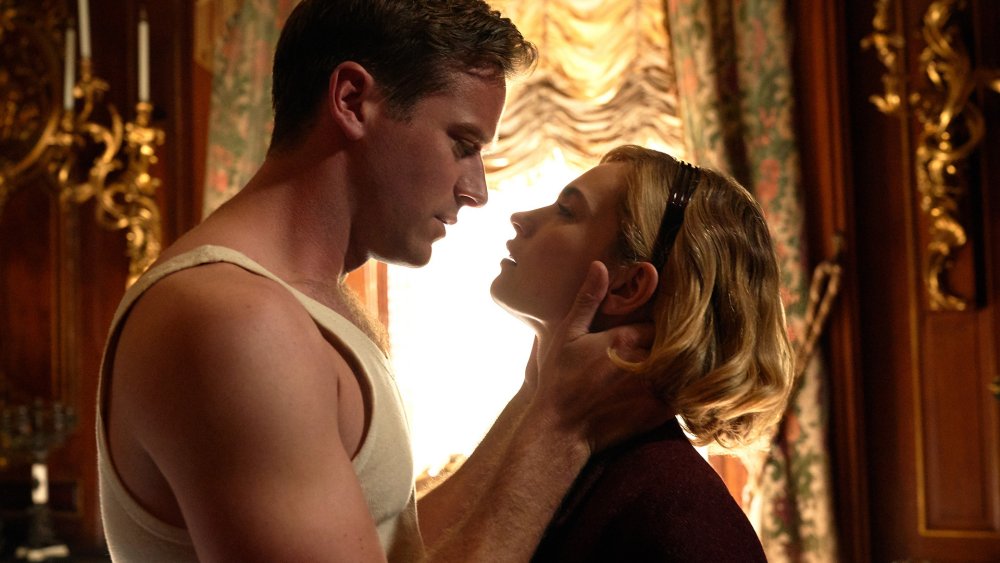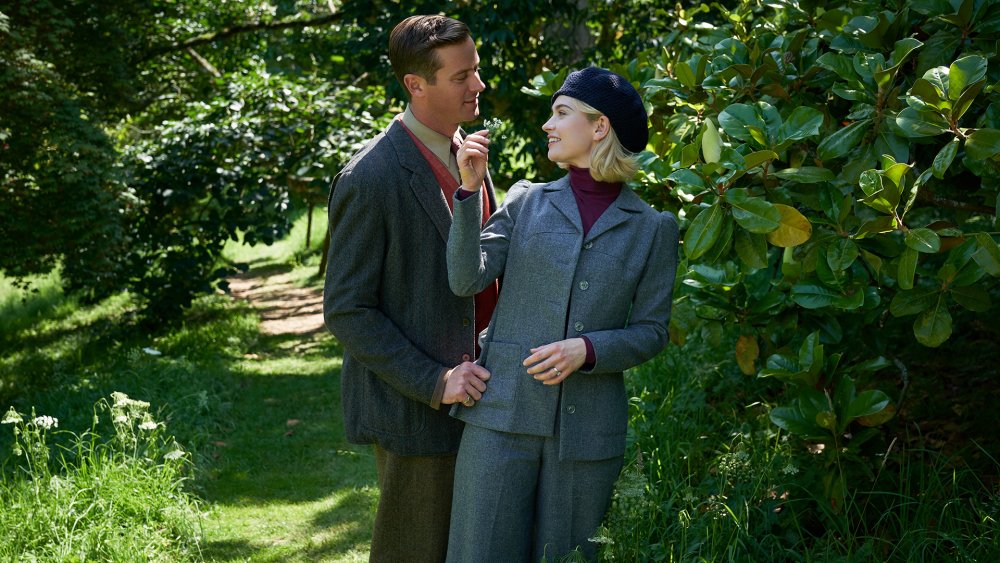Why Lily James Hasn't Been The Same Since Rebecca
This content was paid for by Netflix and created by Looper.
It's hard to say what makes Daphne du Maurier's Rebecca so bewitching. Is it the love story, which begins as a fairy tale romance, only to take a much more sinister turn once the happy couple return from their honeymoon? Is it the palatial estate known as Manderley, where mysteries lurk in every hallway and nothing is quite what it seems? Maybe it's the villains, like Manderlay's arch housekeeper Mrs. Danvers. Maybe it's even Rebecca herself, who, even though she never actually appears in the story, haunts every single page of the classic novel.
Or perhaps it's a combination of everything listed above. At any rate, the only thing we can say for sure is that Rebecca has enchanted audiences for over 80 years, and leaves everyone who experiences it irrevocably changed. Just ask Lily James. The actor, who plays Mrs. de Winter in Ben Wheatley's new adaptation of du Maurier's book, encountered Rebecca at a young age. She was instantly transfixed. "I think my mom gave it to me, or at least she told me to read it, or I had her copy," James says. "I just went back to the book over, and over, and over again. I love the story. I love how Daphne du Maurier writes. I love the character."
But that doesn't mean that filming Rebecca was easy. At its core, this is a story about gaslighting and emotional abuse, leading to some dark and troubling days on set. Still, James went all in. "It was definitely an intense character for me. But I try to fall into it, and give myself to it, and embrace all of that," she recalls. The result? A performance that changed Lily James forever. After all, when you dive into the world of Rebecca, you never emerge exactly the same.
Who is Mrs. de Winter?
In order to understand exactly why filming Rebecca had such a profound impact on Lily James, you need to know a little bit about the character she plays. Mrs. de Winter never officially gets a first name (although James noted that the Rebecca crew called her "Daphne" in tribute to du Maurier), but she's the heart and soul of the story, as well as the victim of its most horrific acts.
While working as a woman's companion to an all-around unpleasant socialite, the young woman catches the eye of a rich, handsome widower named Maxim de Winter. A week later, the two are married, and after a brief honeymoon they arrive at de Winter's family home, Manderley. That's when the trouble starts. Although Maxim's first wife, Rebecca, has been dead for over a year, her memory still looms very, very large. Manderley is still filled with Rebecca's things, and everyone who passes through the estate remarks on how beautiful, charismatic, and poised the late matriarch was.
As Mrs. de Winter struggles to fill Rebecca's huge shoes, Maxim grows increasingly distant, while Rebecca's most trusted servant, Mrs. Danvers, undermines the new bride at every available opportunity. Soon, Mrs. de Winter doesn't know what to believe. "Sometimes you can fool and lose yourself to your own mind, and those voices, and those negative voices in your head," James says, "and if you let them reign, it can be a real rabbit hole." Unfortunately, that's exactly what happens to Mrs. de Winter. As her anxiety and paranoia grow, her sanity slowly slips away, even as Manderley's many mysteries slowly come to a head.
The trauma runs deep
In order to capture Mrs. de Winter's decline, Lily James pushed herself to her limits both physically and mentally. "In the book, there are a lot of references to her always biting her nails," James says. "She self-flagellates, and she beats herself up, and she's cruel to herself. And so I did a lot of that. My hands were raw by the end of this film."
Similarly, the subject matter began having a very real effect on James' psyche. "It was like being in a whirlwind with her, and she's pulled in different directions. Her sense of self is incredibly warped, and not very defined, so living in that head space was, at times, quite difficult," James says. "And also, jealousy and obsession are very toxic emotions. And she lives there too. She becomes obsessed with Rebecca. She becomes very jealous of Rebecca... So it's like, almost like seven deadly sins, it was like playing with different ones every day."
In fact, James became so consumed by the role that Mrs. de Winter began to spill into her personal life, even when the cameras weren't rolling. "I became paranoid," James says. "I was very untrustworthy, because she's so manipulated, my character is, by these other characters, that I began to feel a bit unsafe. So separating how my character felt, and how I felt became, at times, a bit blurred."
After filming ended, James had trouble letting go of Mrs. de Winter and the abuse that she suffered. James had panic attacks that she attributes to her time in Manderley, and observes that Mrs. de Winter's insecurities exacerbated her own. "I felt like there was a lasting effect from that. And it did take me a bit of a while to shake her off," James admits.
Valuable lessons, learned the hard way
The emotional price that Lily James paid wasn't the only challenge she faced when making Rebecca. "There's no let up. I mean, I was in every scene, which I don't think I've ever, ever done before," James observes. Thankfully, she had some help, particularly in the form of director Ben Wheatley. "Psychologically, in his take, there's a darkness to the humanity he portrays," James says. "I was really excited to be in his brain, and in his world, and give into that."
Besides, while playing Mrs. de Winter took a toll on James, the actress came through the experience much stronger than she'd been before. "I find I learn and grow through the characters I play, particularly, and more so than ever, perhaps, with this one," James says. "She's really gaslit, and manipulated by, and bullied by a lot of the characters in the story. She finds herself in a really abusive relationship. And then she empowers herself. So there are huge lessons there."
To James, feminist themes like those are why Rebecca has withstood the test of time, although she admits that du Maurier's novel is also just a great, entertaining story. "It's not what you expect. [Du Maurier] tricks us, and fools us, and manipulates us, and plays with us, and so successfully," James says. "She hides deeper meanings, and I think her ideas on women at the time being so controlled and owned by men, in that they had no life choices really without being a wife. I think that there's so much in it, and I hope that we have created a film that carries all those things."
In the end, James seems to have no regrets. In fact, if she could, she'd sign up for a second round. "I always want to keep going beyond the end of the story, or keep going beyond this film, and see what happens to my character," James says. "I would love to play her again."



